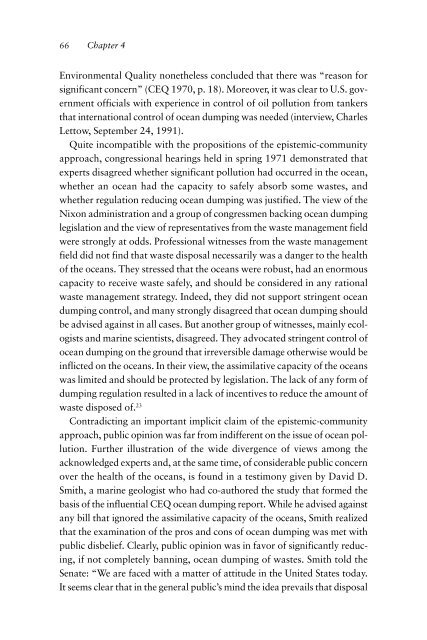Radioactive Waste Disposal at Sea: Public Ideas ... - IMO
Radioactive Waste Disposal at Sea: Public Ideas ... - IMO
Radioactive Waste Disposal at Sea: Public Ideas ... - IMO
Create successful ePaper yourself
Turn your PDF publications into a flip-book with our unique Google optimized e-Paper software.
66 Chapter 4<br />
Environmental Quality nonetheless concluded th<strong>at</strong> there was “reason for<br />
significant concern” (CEQ 1970, p. 18). Moreover, it was clear to U.S. government<br />
officials with experience in control of oil pollution from tankers<br />
th<strong>at</strong> intern<strong>at</strong>ional control of ocean dumping was needed (interview, Charles<br />
Lettow, September 24, 1991).<br />
Quite incomp<strong>at</strong>ible with the propositions of the epistemic-community<br />
approach, congressional hearings held in spring 1971 demonstr<strong>at</strong>ed th<strong>at</strong><br />
experts disagreed whether significant pollution had occurred in the ocean,<br />
whether an ocean had the capacity to safely absorb some wastes, and<br />
whether regul<strong>at</strong>ion reducing ocean dumping was justified. The view of the<br />
Nixon administr<strong>at</strong>ion and a group of congressmen backing ocean dumping<br />
legisl<strong>at</strong>ion and the view of represent<strong>at</strong>ives from the waste management field<br />
were strongly <strong>at</strong> odds. Professional witnesses from the waste management<br />
field did not find th<strong>at</strong> waste disposal necessarily was a danger to the health<br />
of the oceans. They stressed th<strong>at</strong> the oceans were robust, had an enormous<br />
capacity to receive waste safely, and should be considered in any r<strong>at</strong>ional<br />
waste management str<strong>at</strong>egy. Indeed, they did not support stringent ocean<br />
dumping control, and many strongly disagreed th<strong>at</strong> ocean dumping should<br />
be advised against in all cases. But another group of witnesses, mainly ecologists<br />
and marine scientists, disagreed. They advoc<strong>at</strong>ed stringent control of<br />
ocean dumping on the ground th<strong>at</strong> irreversible damage otherwise would be<br />
inflicted on the oceans. In their view, the assimil<strong>at</strong>ive capacity of the oceans<br />
was limited and should be protected by legisl<strong>at</strong>ion. The lack of any form of<br />
dumping regul<strong>at</strong>ion resulted in a lack of incentives to reduce the amount of<br />
waste disposed of. 23<br />
Contradicting an important implicit claim of the epistemic-community<br />
approach, public opinion was far from indifferent on the issue of ocean pollution.<br />
Further illustr<strong>at</strong>ion of the wide divergence of views among the<br />
acknowledged experts and, <strong>at</strong> the same time, of considerable public concern<br />
over the health of the oceans, is found in a testimony given by David D.<br />
Smith, a marine geologist who had co-authored the study th<strong>at</strong> formed the<br />
basis of the influential CEQ ocean dumping report. While he advised against<br />
any bill th<strong>at</strong> ignored the assimil<strong>at</strong>ive capacity of the oceans, Smith realized<br />
th<strong>at</strong> the examin<strong>at</strong>ion of the pros and cons of ocean dumping was met with<br />
public disbelief. Clearly, public opinion was in favor of significantly reducing,<br />
if not completely banning, ocean dumping of wastes. Smith told the<br />
Sen<strong>at</strong>e: “We are faced with a m<strong>at</strong>ter of <strong>at</strong>titude in the United St<strong>at</strong>es today.<br />
It seems clear th<strong>at</strong> in the general public’s mind the idea prevails th<strong>at</strong> disposal

















